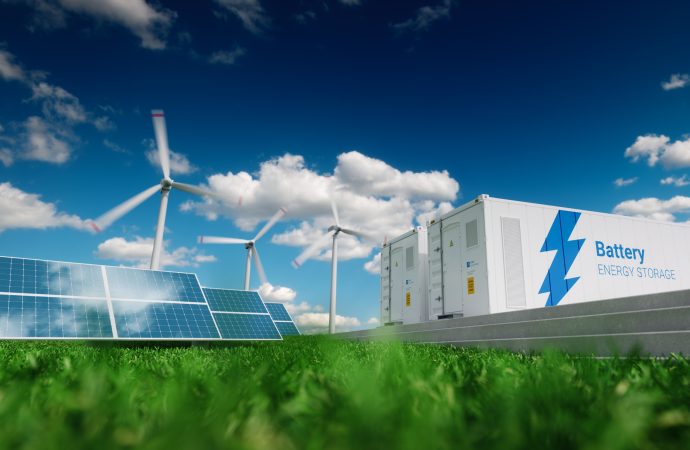In recent years, the landscape of energy storage has been dramatically reshaped by emerging trends in energy storage materials. Advanced battery technologies for renewable energy storage are at the forefront of this transformation. These technologies are designed to store energy more efficiently, reliably, and sustainably. Lithium-ion batteries, for instance, have been the industry standard, but
In recent years, the landscape of energy storage has been dramatically reshaped by emerging trends in energy storage materials. Advanced battery technologies for renewable energy storage are at the forefront of this transformation. These technologies are designed to store energy more efficiently, reliably, and sustainably. Lithium-ion batteries, for instance, have been the industry standard, but new chemistries such as lithium-sulfur, solid-state batteries, and flow batteries are gaining attention. These advanced batteries promise higher energy densities, longer lifespans, and improved safety features, making them ideal for large-scale renewable energy storage applications.
Solid-state batteries, in particular, are proving to be a game-changer in improving renewable energy storage efficiency. Unlike traditional liquid electrolyte batteries, solid-state batteries use a solid electrolyte, which significantly enhances energy density and safety. This innovation reduces the risk of leakage and fire, making them more reliable for both residential and industrial applications. The higher energy density of solid-state batteries also means they can store more energy in a smaller space, which is crucial for integrating renewable energy into the existing grid infrastructure.
Decentralized Energy Storage Solutions

Image by : Yandex
Decentralized energy storage solutions are becoming increasingly vital as they enhance renewable energy reliability. Unlike centralized systems, decentralized energy storage allows for the distribution of energy storage across multiple locations. This approach mitigates the risk of widespread power outages and ensures a more stable and reliable energy supply. By storing energy closer to where it is consumed, decentralized solutions reduce transmission losses and improve the overall efficiency of the energy system.
Innovative storage solutions are being developed to integrate seamlessly with renewable energy sources. For example, home battery systems paired with rooftop solar panels allow homeowners to store excess energy generated during the day for use at night or during cloudy periods. Similarly, community energy storage systems enable neighborhoods to share stored energy, maximizing the use of locally generated renewable energy. These innovative solutions not only enhance energy reliability but also empower consumers to take control of their energy usage and contribute to a more sustainable energy future.
Impact of Policy on Energy Storage Innovation
Policy plays a crucial role in accelerating renewable energy storage technology advancements. Governments worldwide are recognizing the importance of energy storage in achieving their renewable energy targets and are implementing policies to support its development. Incentives such as tax credits, grants, and subsidies are driving research and development in advanced storage technologies. Additionally, policies that mandate a certain percentage of energy to come from renewable sources are creating a strong market demand for efficient storage solutions.
Regulations are also driving investment in renewable energy storage solutions. By setting clear standards and guidelines, governments are providing a stable and predictable environment for investors. This regulatory support is crucial for attracting the significant capital needed to develop and deploy advanced storage technologies. Furthermore, policies that promote grid modernization and the integration of smart technologies are enabling the seamless incorporation of storage solutions into the existing energy infrastructure, thereby accelerating the transition to a more sustainable energy system.
Integration of Renewable Energy and Storage Systems
Advancements in renewable energy storage technologies are significantly improving efficiency. Innovations such as high-capacity batteries, supercapacitors, and hybrid systems are enabling more efficient storage and discharge of energy. These advancements are reducing energy losses and increasing the overall efficiency of renewable energy systems. By storing excess energy generated during peak production periods and releasing it during high-demand periods, these technologies are ensuring a more balanced and efficient energy supply.
The integration of renewable energy and storage systems is also reducing dependency on fossil fuels. By providing a reliable and consistent energy supply, storage systems are enabling a higher penetration of renewable energy into the grid. This reduces the need for backup power from fossil fuel plants, thereby decreasing greenhouse gas emissions and contributing to a cleaner and more sustainable energy future. Additionally, the ability to store renewable energy enhances energy security by reducing reliance on imported fuels and increasing the resilience of the energy system.
Economic Viability of New Storage Technologies
Assessing the cost-effectiveness of renewable energy storage technologies is crucial for their widespread adoption. While the initial investment in advanced storage systems can be high, the long-term economic benefits often outweigh the costs. For instance, the ability to store and use renewable energy when it is most needed can significantly reduce energy bills for consumers. Additionally, the improved efficiency and reliability of advanced storage solutions can lead to lower maintenance and operational costs over time.
Evaluating the economic benefits of renewable energy storage innovations is essential for understanding their full potential. By enabling a higher integration of renewable energy into the grid, storage technologies are reducing the need for expensive fossil fuel-based power plants. This not only lowers energy costs but also creates new economic opportunities in the renewable energy sector. Furthermore, the deployment of advanced storage systems can stimulate job creation and drive economic growth by attracting investments in research, development, and manufacturing.
Environmental Benefits of Advanced Storage Solutions

Image by : Yandex
Advanced storage solutions are enhancing renewable energy efficiency and reliability, thereby providing significant environmental benefits. By storing excess energy generated from renewable sources, these solutions ensure that energy is available when needed, reducing the reliance on fossil fuels. This not only decreases greenhouse gas emissions but also minimizes the environmental impact associated with energy production. Additionally, the improved efficiency of advanced storage systems means that less energy is wasted, further contributing to a more sustainable energy system.
Innovative storage solutions are also reducing renewable energy waste and emissions. For example, by storing excess solar or wind energy that would otherwise be curtailed, these solutions maximize the use of renewable energy resources. This reduces the need for fossil fuel-based backup power and decreases the associated emissions. Furthermore, advanced storage systems can support the integration of electric vehicles and other clean technologies, reducing the overall carbon footprint of the energy system and contributing to a cleaner environment.
Case Studies of Successful Storage Implementations
Several case studies of successful renewable energy storage implementations highlight the potential of advanced storage solutions. For instance, the Hornsdale Power Reserve in South Australia, equipped with Tesla’s lithium-ion batteries, has demonstrated the effectiveness of large-scale energy storage in stabilizing the grid and providing backup power. This project has not only improved energy reliability but also delivered significant cost savings by reducing the need for expensive peaking power plants.
Innovative renewable energy storage solutions in real-world applications showcase the versatility and effectiveness of these technologies. In California, the deployment of home battery systems paired with solar panels has enabled homeowners to achieve energy independence and reduce their reliance on the grid. Similarly, community energy storage projects in Germany have allowed neighborhoods to share locally generated renewable energy, enhancing energy security and reducing costs. These case studies underscore the transformative potential of advanced storage solutions in creating a more sustainable and resilient energy system.
Future Prospects for Renewable Energy Storage
The future prospects for renewable energy storage are promising, with continuous advancements in battery technology driving the field forward. Innovations such as solid-state batteries, lithium-sulfur batteries, and flow batteries are expected to further improve energy density, safety, and lifespan. These advancements will enable more efficient storage of renewable energy, making it more viable for large-scale applications and accelerating the transition to a sustainable energy future.
The integration of AI for optimizing renewable energy storage systems is another exciting development. AI algorithms can analyze energy consumption patterns, weather forecasts, and other data to optimize the charging and discharging of storage systems. This enhances the efficiency and reliability of renewable energy systems, reduces costs, and minimizes energy waste. By leveraging the power of AI, future storage solutions will be more intelligent and adaptive, ensuring a more resilient and sustainable energy system.
















